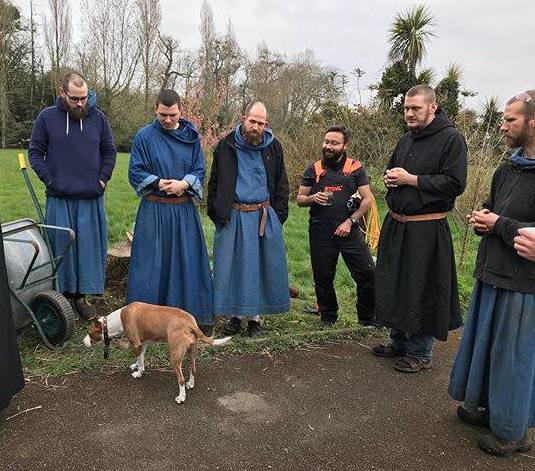Ut in omnibus glorificetur Deus (LVII)

CHAPTER LVII. Of the Artificers of the Monastery
10 Apr. 10 Aug. 10 Dec.Should there be artificers in the Monastery, let them work at their crafts in all humility, if the Abbot give permission. But if any of them be puffed up by reason of his knowledge of his craft, in that he seemeth to confer some benefit on the Monastery, let such a one be taken from it, and not exercise it again, unless, perchance, when he hath humbled himself, the Abbot bid him work at it anew. And if any of the work of the artificers is to be sold, let those by whom the business is done see that they defraud not the Monastery. Let them ever be mindful of Ananias and Saphira, lest perchance, they, and all who deal fraudulently with the goods of the Monastery, should suffer in their souls the death which these incurred in the body. But with regard to the prices of such things, let not the vice of avarice creep in, but let them always be sold a little cheaper than by men in the world, that God may be glorified in all things.
The artificers of the monastery are those brethren who know how to ply a craft, or who have special skills, or talents — practical, manual, artisanal, professional, artistic, or academic — that are profitable for the life of the community or for its subsistance. Every brother has his gift and every brother is capable of contributing to the life of the monastery in some way. What Saint Paul says concerning spiritual gifts must be applied to the whole array of gifts, talents, and specialisations that one finds in the monastic family:
Now there are diversities of graces, but the same Spirit; And there are diversities of ministries, but the same Lord; And there are diversities of operations, but the same God, who worketh all in all. And the manifestation of the Spirit is given to every man unto profit. (1 Corinthians 12:4–7)
More than anything else, Saint Benedict insists on humility and obedience: “Let them work at their crafts in all humility, if the Abbot give permission”. It can happen that a brother begin to think of himself as so valuable and indispensable to the life and economy of the monastery, that he begins to look upon others as insignificant or of little worth. The brother who enters the monastery crowned with academic laurels and with diplomas in hand is not more important one who enters with manual skills. The brother who enters the monastery with professional qualifications is not more important than the brother who enters qualified only by his readiness to obey and to apply himself to whatever is asked of him.
From the Declarations on Chapter LVII:
139. Given that the monastery’s most precious human resources lie in the diversity of aptitudes and gifts and in their development, the community hold in honour the humble and noble vocation of the monachus conversus or lay brother in complementarity with that of the choir monk.
140. Praying and working under the special protection of Saint Joseph, the lay brothers form an integral part of the monastic family. Obedient in their dedication to manual work and the cultivation of practical skills, the lay brothers participate in the life and mission of the monastery in such wise that «in all things God may be glorified».
141. A lay brother may, at any time, be dispensed from attendance at the Divine Office if the Prior judges that the needs of the monastery require it.
142. Should it happen that some extraordinary task deprive one or more of the brothers of the time set aside for prayer, they will offer this sacrifice to Our Lord without murmuring, mindful that sacrifice is perfected by obedience, and that they are bound to submit to it humbly.
And from the Statutes on Chapter LVII:
140a. When unable to assist at the Divine Office in choir, a lay brother observes the Hours by reciting some Psalms by heart or by praying part of the Rosary of the Blessed Virgin Mary. A lay brother may also attend as much of the Divine Office in choir as his work allows.
The brethren engaged in remunerative work for the monastery must protect and foster the interests of the community. At the same time, avarice must not be allowed to inflate the monastery’s rightful compensation for goods or services rendered. Monks, should, in fact, charge a little less than worldlings for their work. The little amount thus lost becomes a sacrificial gift that redounds to the glory of God. There is no component of the monastic life that is not directed to the glory of God. The Benedictine ethos is essentially liturgical and theotropic. Ut in omnibus glorificetur Deus.
